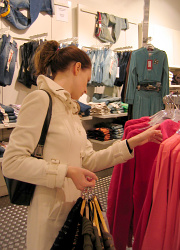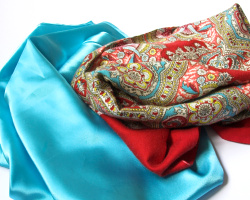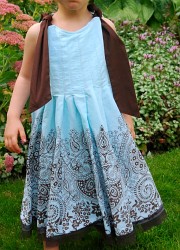How can I reduce my addiction to cheap clothes?
 Confession time: I’ve got an awful cognitive dissonance thing with buying cheap clothes – I know about the horrific conditions in sweatshops, I know how cotton production is incredibly damaging to the environment, I know how the clothes produced in sweatshops are (understandably) far from good quality and liable to fall apart quickly, I know how much energy is wasted transporting them around the world and I know that shop employees, especially in the cheapest pile ’em high, sell ’em cheap shops, are treated poorly and paid badly – and yet…
Confession time: I’ve got an awful cognitive dissonance thing with buying cheap clothes – I know about the horrific conditions in sweatshops, I know how cotton production is incredibly damaging to the environment, I know how the clothes produced in sweatshops are (understandably) far from good quality and liable to fall apart quickly, I know how much energy is wasted transporting them around the world and I know that shop employees, especially in the cheapest pile ’em high, sell ’em cheap shops, are treated poorly and paid badly – and yet…
I think I got into “buy them cheap when you see them” habits as a teenager when I didn’t have a lot of money and there wasn’t quite as many cheap clothes around as there is now (those quaint days before Primark and £4 supermarket jeans) – I’d always wear black vest tops, for example, so I might as well snap them up when they’re in the sale whether I need them at that exact moment or not. That habit stuck even when I started working and had a bit more money because, well, it’s a bargain, isn’t it? who can refuse a bargain? plus, I’d still wear that black vest top at some point. Once I’d got through the other 30 in my bedroom drawer of course.
Even knowing all those things I know about why I shouldn’t buy cheap clothes AND having a wardrobe packed full of previous purchases, I still have the desire to buy things. If I’d just ambling about a town centre, I find it really difficult to walk past a red “SALE!!” sign without at least ducking in to see what’s on offer. It’s horrible, an addiction. The funny/depressing thing is I don’t really like fashion – I don’t crush on works-of-art shoes or this season’s must-have skirt, I nearly always buy the same dull stuff – I have many, many coloured tshirts/vest tops, at least half a dozen horizontal-striped hoodies and at least ten black cotton shirts.
So I have a problem. I realised this properly a few years ago and I’ve been working on ways to manage it since then. When I stopped commuting to work every day via the city centre in 2006, my access to shops and those alluring “SALE!!” signs dropped back dramatically and that helped a bit. Every time I visited the mini-high street near my (old) house though, I ended up in the charity shops up there and I felt I had to “make the most” of my now occasional visits to the city…
More recently, I’ve been internalising some personal rules to make me stop and think before buying: I won’t buy something unless it’s at least 50% natural fibres (although in practice, I’m actually stricter – going for only stuff that’s a minimum of 80%, usually 100% natural fibres) and I *must* try it on before buying it. (I never used to try things on because I couldn’t be bothered waiting in the queues at changing rooms and always thought “well, I can just take it back if it doesn’t fit” – although I never did take stuff back, charity shops got a lot of brand-new-with-tags items from me…) These rules slow me down and make me think about things while still letting me get that “I got to check the sale rack” satisfaction.
Do you have any similar personal guidelines when it comes to shopping? Since price and quality have become somewhat detached these days, how do you decide what to – and what not – to buy?
Do you have any other advice to help me with my (I suspect not uncommon) problem? I’m worried that if I “just say no” and stop buying clothes cold-turkey that I’ll displace my buying urges from clothes onto something else – craft supplies or books for example – so I’m ideally looking for ways to deal with it rather than just plain avoidance of all shopping outlets (particularly since eBay is only ever a click away…)
























I find that most addictions that I have are actually habits. If I can avoid that habit for 2 weeks then I have a good chance of changing that habit forever. I would say to try to avoid situations where you indulge in the habit. Try to find something else to reward yourself with. Stay home and do something else instead, like maybe bake some no-knead bread.
I’m quite lucky in a way — I’m a funny shape, so it’s hard to buy cheap clothes that fit.
I periodically go through my wardrobe and try to plan outfits round what I already have. Quite often I’ll spot that two things will go together but would need another item to make an outfit.
So I keep a mental list of those needed items; and I don’t buy anything but those. I quite often find what I do need in a charity shop.
I do have a bit of a problem when it comes to vests, however: M&S coloured cotton ones to be precise… I can’t help buying one when I see a new colour out. But I do wear them, honest — they are incredibly useful for making low cut tops less immodest.
Perhaps keep a laminated card in your wallet that says: “How much do these clothes REALLY cost?” with some of your favourite sweat shop. stats.
I definitely have this problem as well, but I’ve been trying to curb it by only allowing myself to buy clothes from thrift stores, vintage stores, second hand, etc. I don’t think about the conditions my clothes were made in much this way, because I’m not supporting that industry or those people directly. There are SO many old clothes looking for homes, I just can’t bring myself to buy new things.
Also, when I’m done with a big pile of these cheap clothes, I reuse them again! Give them away to friends (or have a clothing swap party, or a mend-it/fancify-it party), resell on ebay, or you could even go drop them back off at the thrift store and they’ll go through the cycle again.
I have being buying second hand clothes (outer garments)for years and rarely buy new. And now, I am even cutting back on the amount of second hand clothes I buy. I am lucky that I make jewellery and can create a new look with accessories. I am also fortunate to be female and be able to dress up or down with makeup and different shoes depending on the social/work situation.
I have become aware from shopping in charity shops how frequently people will buy a range of tops or handbags in different colours, perhaps because they all look so good together in the shop and because they are so cheap, oh well why not decide at home…cheaper to buy all than to pay the bus fare or parking to take it back.
I have done eco fashion projects where we take clothes donated from the shelves of charity shops, that have not sold and were heading to the rag man. I can not believe how often the orginal shop sales tag is still on there.
Have you ever heard of Wardrobe Refashion?
http://nikkishell.typepad.com/wardroberefashion/
Basically, you use your old clothes or clothes from resale/thrift shops to make new clothes. It satisfies the need for something different in your wardrobe while avoiding the purchase of new, cheap stuff. *Old* cheap stuff is a different story, of course; I got several slightly stained cashmere sweaters for fifty cents each at the thrift store to make luxury mittens!
You could try a one in, one out policy – every time you buy something new you have to get rid of something else.
With Ebay, try a policy of never spending more than you’ve made by selling stuff. It’s easy to control because Paypal keeps everything you earn in your Paypal account, so if you never link your Paypal with your bank account then you can only use it to spend what you’ve earned on Ebay.
Now if only I could follow my own advice – I’m a massive ebay addict…
I’ve been trying to cut down myself – and in the process have become a bit of a clothes designing addict. I have a big box of all my family’s old clothes, mostly things I grew out of a year or two ago and I’ve got into the habit of draping bits around myself and thinking ‘how would this look as a skirt?’ etc and I’m ending up with a lot of well-fitting, my-style, practically free clothes which don’t harm the environment. Like anything of this type, it takes alot of time and when I’m shopping I usually say to myself – ‘Ok, I’ll see If I still want this when I’ve finished making …..’ I almost never do.
if you are goin to buy cheap clothes, you shoudl make sure that you where them 24 times before buy the next item and make sure that you recycle them once they have fallen apart
We are exchanging things on http://www.wymienprzez.net if you have things which you don’t need please exchange with another person it is good fun and ECOLOGIKAL
I really have difficulty buying new clothes, even though my leg length is difficult to fit. I find the clothes at second hand shops can be of such good quality, that it’d cost a fortune to buy new. There is a huge choice of shops and articles in them., I got a smashing pair of Clarkes shoes, all but brand new, which would have cost at least £40 new, for £5. Can anybody argue against that? I’ve had the shoes for 2 years, keep them regularly polished, and they are hardly worn and still look very good. However if you get bored I don’t suppose that’s the way for you.
I try to buy real leather shoes so they don’t wear out as quickly. If I can’t resist buying plastic flats, I at least don’t pay very much for them. Try Peruvian cotton, it’s some of the best in the world. It’s so smooth it feels synthetic, and it retains its shape so well.
I used to be like this, going to a particular shop every weekend because there was always something I saw…Still, I always had to try the things on. Always. That’s the reason my closet is full with clothes that fit me perfectly.
Now I don’t shop too much, if I enter a shop I know exactly what I’m looking for.
My advice is: do your thinking at home, a season ahead, not in the shop.
You know your lifestyle, you know what events are coming in the near future…so prepare.
I don’t ask myself in the morning “what will I wear today”? I ask “What will I wear next season”? By next season I mean current season, next year. If my winter boots are heading to the trash at the end of February, I know I need boots for next winter. So I shop the sales.
You’ll see how much time you’ll save. And money. You’ll be more critical about the things you buy, you’ll go for better quality.
Hope it helps.
Before shopping, check online what clothes are out of fashion already, that will reduce plenty of buys from thrift stores and clearences.
Think quality, think prestige and you will have enough money for only few great pieces.